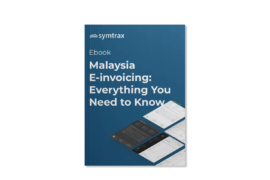Malaysia is advancing towards digitalization with the Inland Revenue Board of Malaysia (IRBM) mandate, raising questions about implementation, legality, and guidelines governing the e-invoicing process. All businesses registered in Malaysia are required to generate e-invoices for B2B, B2G, and B2C transactions.
The first phase of this e-invoicing mandate targets businesses with a turnover exceeding RM 100 million, marking the beginning of the e-invoicing implementation.
Key Insights
The eBook provides comprehensive insights into various aspects of Malaysia's e-invoicing process, including:
- Global E-Invoicing Journey: Understanding the global context and evolution of e-invoicing.
- E-Invoicing in Malaysia: Definition and specifics of e-invoicing in the Malaysian context.
- Implementation Timeline: Key dates and phases for the rollout of e-invoicing in Malaysia.
- Process and Specifications: Detailed technical and mandated specifications for the complete e-invoicing process.
- B2B Transactions: Specifics of the e-invoicing process for B2B transactions.
- E-Invoicing Model: The framework and structure of the e-invoicing system in Malaysia.
- Types of E-Invoices: Different types of e-invoices used in Malaysia.
- Benefits: Advantages of adopting e-invoicing in Malaysia, including improved accuracy, efficiency, and compliance.
The IRBM's e-invoicing mandate is a pivotal step towards digital transformation in Malaysia, providing clear guidelines for businesses. By understanding and adhering to these regulations, businesses can ensure a smooth transition and enjoy the benefits of enhanced invoicing accuracy and operational efficiency.
